 January 2019 in “Springer eBooks”
January 2019 in “Springer eBooks” Acne is linked to inflammation and insulin resistance, and is associated with various syndromes that require different treatments.
 February 2018 in “InTech eBooks”
February 2018 in “InTech eBooks” Diagnosing and treating PCOS is complex due to differing criteria and requires a team approach.
 January 2018 in “Springer eBooks”
January 2018 in “Springer eBooks” The document says that early treatment of Acne Vulgaris is important to prevent scarring and that adult onset acne is common in women, often due to hormonal imbalances.
 July 2017 in “Contemporary Endocrinology”
July 2017 in “Contemporary Endocrinology” The document concludes that patient outcomes for Congenital Adrenal Hyperplasia are often not ideal because of poor management and a need for better diagnosis and treatment methods.
 July 2017 in “Cardiologia Croatica”
July 2017 in “Cardiologia Croatica” Metabolic syndrome's individual issues are real and need treatment to reduce diabetes and heart disease risks.

The conclusion is that a more comprehensive and precise approach is needed for diagnosing PCOS to address its broader health risks.
 September 2016 in “Más dermatología”
September 2016 in “Más dermatología” New factors in female hair loss include genetics, hormones, stress, and inflammation; future treatments should also focus on these areas and consider the patient's emotional well-being.
 December 2015 in “Kosin Medical Journal”
December 2015 in “Kosin Medical Journal” PCOS treatment should address both symptoms and metabolic risks, starting with lifestyle changes and possibly including medication.
 July 2015 in “Cambridge University Press eBooks”
July 2015 in “Cambridge University Press eBooks” The document concludes that careful history and physical exams are crucial for accurately diagnosing polycystic ovary syndrome and distinguishing it from other similar conditions.
 January 2015 in “Endocrine updates”
January 2015 in “Endocrine updates” Bariatric surgery patients need careful before and after surgery care for safety and long-term health.
 November 2014 in “John Wiley & Sons, Ltd eBooks”
November 2014 in “John Wiley & Sons, Ltd eBooks” Eating high-glycemic and dairy foods can increase hormones that may cause acne and other health issues.
 May 2010 in “Current Women's Health Reviews”
May 2010 in “Current Women's Health Reviews” The document concludes that early diagnosis and treatment of PCOS in teenagers is important for managing symptoms and preventing long-term health problems.
 June 2008 in “CRC Press eBooks”
June 2008 in “CRC Press eBooks” PCOS may have evolved as an advantage in past environments with food scarcity.
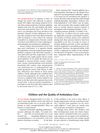 January 2008 in “The New England Journal of Medicine”
January 2008 in “The New England Journal of Medicine” Children receive less than half of recommended health care, and routine hormonal testing for female-pattern hair loss is unnecessary without other androgen excess symptoms.
 October 2007 in “Current Respiratory Medicine Reviews”
October 2007 in “Current Respiratory Medicine Reviews” Women with PCOS are much more likely to have sleep problems and should be checked for them.
 September 2004 in “Experimental dermatology”
September 2004 in “Experimental dermatology” Melatonin directly affects mouse hair follicles and may influence hair growth.
 February 2004 in “The New England Journal of Medicine”
February 2004 in “The New England Journal of Medicine” The book is a comprehensive resource on hair disorders, but lacks information on some conditions.
 February 2004 in “The New England Journal of Medicine”
February 2004 in “The New England Journal of Medicine” The book is a comprehensive and current guide on hair disorders, with minor flaws.
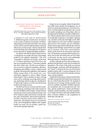 February 2004 in “The New England Journal of Medicine”
February 2004 in “The New England Journal of Medicine” The book is a useful resource for healthcare providers working with hospitalized children but misses some important studies and detailed problem evaluations.
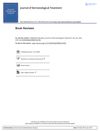 January 1998 in “Journal of Dermatological Treatment”
January 1998 in “Journal of Dermatological Treatment” The document recommends all three dermatology books for a library, noting their detailed content but also suggesting improvements in clarity and consistency.
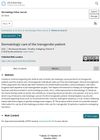 10 citations,
January 2016 in “Dermatology Online Journal”
10 citations,
January 2016 in “Dermatology Online Journal” Hormonal therapy in transgender patients can lead to skin changes like altered sebum production, hair growth, and acne, which may require dermatological care.
26 citations,
August 2008 in “Clinical endocrinology” The document concludes that more multidisciplinary research is needed to understand and treat PCOS, a condition that significantly affects women's health and quality of life.
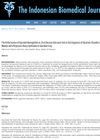 1 citations,
June 2021 in “The Indonesian Biomedical Journal”
1 citations,
June 2021 in “The Indonesian Biomedical Journal” Glycated hemoglobin is not as effective as the oral glucose tolerance test for diagnosing blood sugar problems in women with PCOS in Southern Iraq.
 April 2023 in “Expert opinion on pharmacotherapy”
April 2023 in “Expert opinion on pharmacotherapy” Birth control pills and antiandrogens are the most effective medicines for excessive body hair in women, but combining them with other treatments and psychological support is best.
May 2022 in “Endocrine practice” High-dose biotin can cause false thyroid test results; stop taking biotin two days before testing to avoid errors.
 January 2009 in “Springer eBooks”
January 2009 in “Springer eBooks” Skin problems can be a sign of hormone-related diseases.
May 2019 in “Faculty Opinions – Post-Publication Peer Review of the Biomedical Literature” ![Activity of 17β-(N-Alkyl/Arylformamido) and 17β-[(N-Alkyl/Aryl) Alkyl/Arylamido]-4-Methyl-4-Aza-5α-Androstan-3-Ones as 5α-Reductase Inhibitors in the Hamster Flank Organ and Ear](/images/research/861159f1-7bd4-420c-a16b-4829458efe68/small/15592.jpg) 10 citations,
August 1998 in “Journal of Investigative Dermatology”
10 citations,
August 1998 in “Journal of Investigative Dermatology” The compounds tested could potentially treat hair loss and alopecia.
 5 citations,
June 1998 in “PubMed”
5 citations,
June 1998 in “PubMed” Excessive androgen in women can cause acne, hair growth, baldness, and PCOS, often treatable with medication.
 2 citations,
July 2023 in “Frontiers in Endocrinology”
2 citations,
July 2023 in “Frontiers in Endocrinology” The review found that current care models for PCOS are not fully effective and more research is needed, especially in low-income countries.

























![Activity of 17β-(N-Alkyl/Arylformamido) and 17β-[(N-Alkyl/Aryl) Alkyl/Arylamido]-4-Methyl-4-Aza-5α-Androstan-3-Ones as 5α-Reductase Inhibitors in the Hamster Flank Organ and Ear](/images/research/861159f1-7bd4-420c-a16b-4829458efe68/small/15592.jpg)

